How To Design A Brand Logo (With Ease)
Suzanne ScaccaAs a web designer, you may find yourself in a position where a client wants you to design their brand logo. If you’re feeling up to the task, there are some things you need to know first.
For instance:
- How do you translate the value of a brand into a logo?
- Where can you go for logo design inspiration?
- Which tools should you use to create a logo (like Wix Logo Maker)?
- How do you piece together a logo from a bunch of ideas?
Make no mistake: designing a logo is just as complex a task as building a website. Not only do you need to understand what goes into making a great logo, but you need the right tools to create it.
If you’re thinking about doing this, the following guide will answer the four above questions for you.
Tips For Defining Your Brand With Great Logo Design
Let’s say I invited you over to my apartment and you got a gander at my workspace. Here it is:
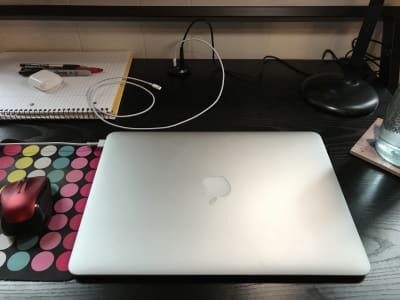
Even if you’re not an Apple user, you’d instantly know that I was working from one of their laptops. While Apple’s distinctive product design might be the clue you pick up on first, the apple icon would certainly seal the deal.
The Apple logo design is memorable and leaves a lasting impression — even without having to spell out the company name.
This is what you want to accomplish when designing a brand logo for your client. And here is how you should go about piecing it together:
Make no mistake: designing a logo is just as complex a task as building a website.
“
Tip #1: Ask The Right Questions
Your client might come to you with logo designs that they like the look of and tell you to run with it. Or they might simply suggest you take the company name and make it look “cool”.
But that’s not how great logos are built.
Just as you dive deep into a client’s business, its mission, and what kind of value they bring to their target user before building a website, you’ll have to do similar research for a logo.
Which Questions Do You Need To Ask?
What’s nice about logo design and web design is there’s a lot of overlap in what you need to ask clients to get started. So, consider building a questionnaire that tackles both pieces if you’re building both the branding and site for your clients.
For now, let’s look at the logo questions:
| Why did you start your company? | If you can get to the heart of why they went into business, you’ll be able to create a logo that feels more genuine to that original mission. |
| What does your company do? | Identifying this is important as you don’t want to design something that looks great, but is all wrong for the market they’re working in. |
| Who do you serve? | While the client’s opinion of the logo matters, you need to focus on building something that looks good from the eyes of their audience. |
| Why do customers choose your company over others? | Their unique selling proposition will help you differentiate their logo from the competitors’ designs. |
| Who are your top 3 competitors? How do you feel about their logos? | This is a great question to ask if you want to get a raw, emotional response as opposed to the more buttoned-up responses the other questions may elicit. |
| What are your company’s values? | A good way to identify a unique edge for a brand is by looking at what they prioritize. Integrity? Customer commitment? Green initiatives? |
| How would you describe the company’s personality in 3 words? | You’ll be able to get a sense for the company’s “voice” when you talk to the business owner. But it’s always good to see how they describe it, too. |
| Do you have a slogan? | You won’t necessarily build the words into the logo (especially since there’s no room for it on mobile). But a slogan can help inform the design. |
| Where do you see your company in 5 years? | Rather than design something that looks good for the company on Day 1, you should create a logo that captures who they plan to be in the near future. |
| Who are your heroes and why? | Take a gander at the companies they look up to. Even if they don’t have a clear vision for their company yet, who their heroes are will give you a clue as to where they’re heading. |
One last thing to ask is whether or not they’ve selected brand colors or fonts yet. The likelihood of this is slim if they’re asking you to design a logo, but it’s better to ask now than to find out later and have to rework it.
How Do You Get The Answers You Seek?
There are a couple of ways to do this. You could always schedule a call with your client and run through the questions with them. The only problem with that is it could either end up feeling like storytime or like pulling teeth.
In my opinion, the better option is to automate this with an online questionnaire. (This also allows you to scale your logo design efforts). Google Forms is always a great option as it’s easy to use and it’s free.
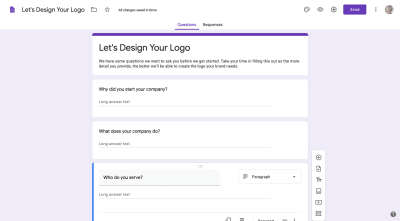
But if you’re already using something like Content Snare to collect files and information from web design clients, you might as well use it for this as well.
Tip #2: Get Inspired By Other Logos
Once you have a clear idea of who your client is and the message they want to convey, it’s time to start designing. But it won’t be as easy as writing out the name of the company and then adding graphical elements to it.
Take some time to do research on the competitive landscape and to gather outside inspiration for your client’s logo.
For the purposes of this post, let’s pretend that your new logo client is opening a dog grooming business in New York City. Here’s an example of how you might survey the competitors’ logos:
This is the logo for Bark Place NYC:
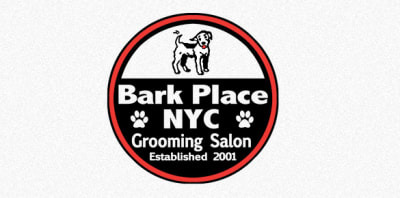
Note the following:
- Seal-shaped logo would work well across all channels (especially social).
- Simple and clear graphics can easily be repurposed for favicon or standalone pictorial mark.
- Additional info and strong design choices lend credibility to the brand.
This is the logo for Camp Canine:
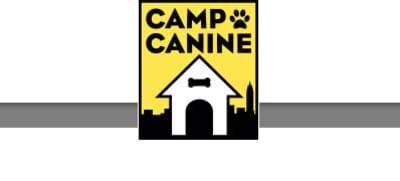
Note the following:
- Cute design uniquely plays on the NYC skyline.
- Color palette is striking enough where it’ll stand out no matter how big or small it appears (like in the favicon).
- The geometric design and strong sans serif font suggest stability within the brand.
This is the logo for Dog Room Club:

Iffy color choice aside, note the following:
- The negative space design is unique and works well with the designer’s use of the recognizable Scottish Terrier dog breed.
- The star is a good choice as it can be used on any channel and would be instantly recognizable.
- The star symbol is a nice way to give this salon an air of luxury (like a VIP club).
Based on the information provided by your client, it might also be beneficial to look outside their industry for inspiration — especially if they’re looking up to titans of other industries. By starting with the competition though, you’ll get a good idea of what the logos and brands all have in common (if anything).
For example, in this particular space, we see a lot of pictorial logos with animal-related images. But in terms of colors, fonts and even shapes, the personality of the business and the unique selling proposition have led to wildly different designs.
As you survey existing logo designs, consider how closely you want your logo design to align with or how far it should deviate from them. At this point, you know your client fairly well, so when you see something that’s more in the vein of what you’re trying to do (or not do), you’ll immediately know it.
Tip #3: Find The Right Tool To Create Your Logo
When it comes to designing a logo for your client, you should be using a tool that makes your job easier. But that “job” really depends on what your client is paying and what their expectations are.
For Pre-made Logo Design
Are you going to compile a batch of premade logos — personalized with their info, of course — and let them choose the one they like best?
In that case, a free logo maker tool would work fine. So long as there’s a variety of logo styles to choose from in your client’s niche, you should be able to find plenty of designs to share with them.
Best for:
- Very small budgets;
- Really short timelines (i.e. a day or two);
- Temporary logos.
For Custom Logo Design
Are you planning to create 10 custom logos and run through series after series of “Which do you like?” questions until you whittle it down to one winning design?
In that case, you’ll want to design it with your Adobe Illustrator or Sketch software. The process will take a while, but if your client has the money to spend and wants something truly unique, this is the best way to do it.
Best for:
- Price is no object,
- Client envisions something very specific,
- Enterprise clients in very high-profile positions who can’t afford to have their logo look like anyone else’s.
The Best Of Both Worlds (Custom Design Without The Hassle)
Would you prefer something between the two options above, where you could wield your creative influence to create something custom without all of the hassle?
In that case, the Logo Maker that Wix offers is your best bet. You can use this tool for a wide range of clients — those that want something done quickly and cheaply all the way up to clients who want a personalized logo.
Best for:
- Any budget;
- Any timeline;
- Logos you don’t want to spend too much time designing graphics for, but still want to be able to customize the key elements (like colors and layout).
“
Why Is the Wix Logo Maker The Right Tool For You?
Similar to the Wix site builder platform, Wix Logo Maker aims to make light work of what would otherwise be time-consuming and tedious work.
It’s an easy, intuitive way to design the perfect logo for your client and spares you the trouble of having to start from scratch while still creating something custom (if that’s what you need).
Let’s take a closer look.
The Logo Questionnaire
Similar to the client questionnaire I recommended you create above, Wix takes you through a series of questions as well.
First, it asks for the name and slogan for the business:
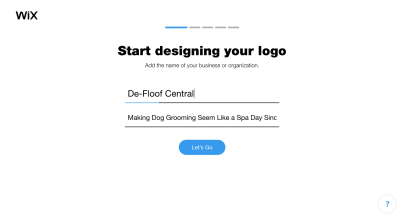
The next thing it asks for is your industry:
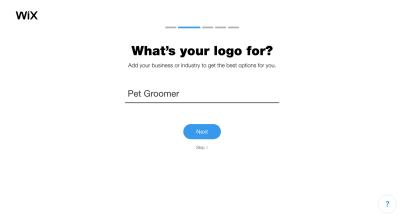
Next, it wants to know about the style and personality you want for the logo:
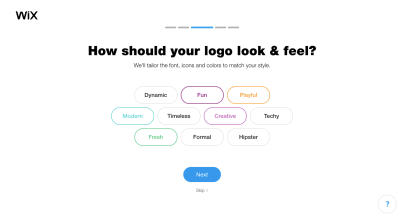
After that, the questionnaire will take you through a series of logo designs, trying to get a sense for what you like and don’t like:
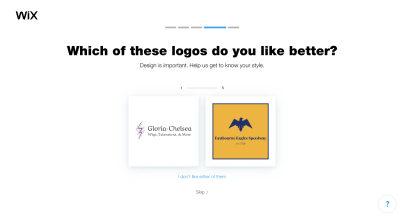
It also takes into account where this logo will appear:
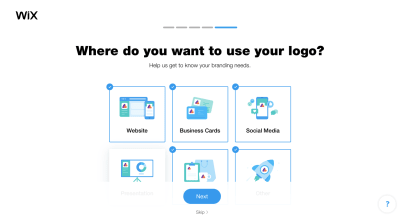
Dozens Of Premade Logos To Choose From
All of these questions will eventually lead you to this page. There are dozens of logo designs that have already been populated with the company name, tagline (if you have one) and sometimes a pictorial mark matching the industry you gave:
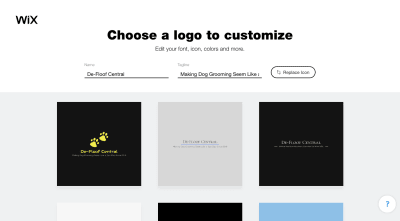
Like I said, if you have a client that has a small budget but wants your help finding the right logo for their business, you could just as well use this logo maker. You’ll receive over 80 different logos to choose from, so you could realistically cherry-pick the logos you think would work best and run with that.
Or…
If you’re contracted to design something more custom, this logo maker enables you to do that as well.
Customizing Your Logo Design From Every Angle
There are so many things to consider when it comes to designing a logo. Luckily, Wix Logo Maker keeps you from having to figure out what those key elements are.
This is the logo maker:
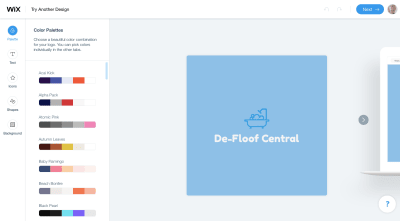
On the sidebar, you’ll find the key areas of the logo you need to focus on. You can use the preset options available or you can click into the logo and start editing the most granular pieces of each element:
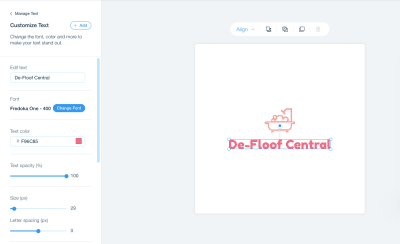
Here are some things to think about as you work on your logo:
Colors
There’s more to color selection than how good it looks. Color comes with a lot of meaning and it can have an effect on customers’ emotional responses as well. It also can impact the readability and accessibility of your site. So, before you jump to using any particular set of colors, brush up on color theory and make sure you have the right ones picked out.
Although this is something you’re probably thinking about from the beginning, it might be a good idea to save it to the end after you’ve dealt with the structure of the logo.
Typography
If the company name and/or slogan is to appear in the logo, typography is something you’ll need to spend a lot of time considering. Again, this isn’t just an aesthetic choice. It can have a serious impact on memorability, emotionality, and accessibility.
If you haven’t read this post from Andy Clarke on how his approach to typography changed after reading about typographer Herb Lubalin, give it a look before you work on your logo.
Iconography
Icons can do a lot of good for logos. They can add balance. They can provide insight into what the business is about if the name is obscure. They can bring more personality to the design. They can also serve as a stand-in in smaller spots, like the browser favicon or as a social media profile image.
What’s nice about this Logo Maker is that you don’t just get to personalize the icon, but also the shapes within or behind the logo. So, you can play with depth, geometry and layout when designing your logo as well.
Collecting Your Logo Assets
Once you’re happy with the logo you’ve designed and your client has signed off, Wix continues to streamline the process with one final step:
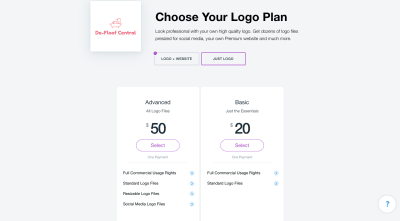
You have two options:
- Download (or print) all logo PNG files, resizable SVGs, and 40+ social media logos.
- Get the standard logo PNG files in a range of colors.
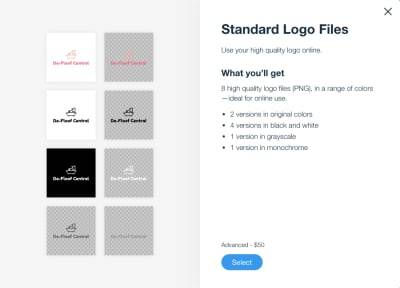
As you can see, everything’s been thought of. So, it’s less time you have to worry about exporting your logos in the right file formats, sizes, and colors. You just need to focus on creating something your client will love.
The Value Of A Well-Designed Logo
A lot of a brand’s success hinges on how great their logo design is. So, of course, you want to design a professional and modern logo that will serve your clients well. By taking the time to learn about your client’s business, creating a design around their vision, and then using the right tool to bring it all together, you’ll be able to do just that.

from Tumblr https://ift.tt/2ysZTIE
No comments:
Post a Comment